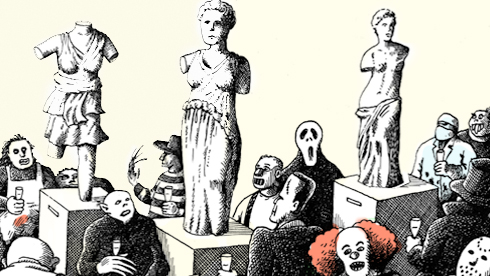Unveiled at the beginning of the year, the EU-US negotiations on the establishment of a free trade zone have met with an enthusiastic response from some, but also with concerns from others. According to Martin Schulz, president of the European Parliament, the planned agreement will “help to create high-quality jobs and boost economic growth on both sides of the Atlantic without costing taxpayers any money. It will establish the world's largest free trade zone and reinvigorate transatlantic relations.” Most EU economics ministers favour of the deal, which makes its signing highly likely. But if it is signed, culture may prove its first and greatest casualty.
In 1988, the European Commission introduced uniform rules, known as the “cultural exception”, under which films and audiovisual works are treated differently than other commercial products. This means, among other things, that they can be supported by member states through various mechanisms because the “promotion of culture is one of the EU’s main policy goals.” But if the EU-US free trade agreement enters in force, both films and music will be relegated to the role of ordinary commercial products. What does this mean?
In the first place, the closure of national film institutes, which provide funding for the majority of European film productions (in Poland this is the Polish Film Institute, or PISF). These are public institutions established precisely in order to implement cultural protectionism. But it is not the disappearance of the institutions themselves that would create a problem. It is the disappearance of the funds they secure for cultural promotion, by collecting charges from movie distributors and television broadcasters. Without these funds, the films of Polish directors such as Smarzowski, Jakimowski, Krauze or Holland, or European ones such as Haneke, the Dardenne brothers, or Mungiu, would never be made.
Differing views of culture
Also under threat are the so called European quotas, a regulation under which TV broadcasters in the EU are required to broadcast at least 50 per cent of European content. The current public media financing system, including a universal television licence, will not be possible under the planned agreement. Nor will be public support for small movie theatres showing European (and European-supported) film productions, or for European song writers. Under Poland’s current media law, radio broadcasters are required to broadcast at least 33 per cent Polish content. If the free trade agreement becomes law, this requirement will become null and void.
Contrary to what it might seem, cultural goods and services are not a marginal issue in the EU-US free trade negotiations. Washington has long been calling for the EU to liberalise its cultural market, but the EU has remained unconvinced. “Already today up to 60 per cent of the movies shown in cinemas in Poland or France are Hollywood productions,” said Jacek Fuksiewicz at the PISF. “What happens when we withdraw public support for European cinema?”
“The Americans think like sales managers. In the US, filmmaking is an industry, one that has grossed more money every year than that of any other country since the 1920s. But in Europe this is not how we view culture,” added Dariusz Jabłoński, president of the Polish Film Academy.
Decision time
More than 7,000 filmmakers, with nearly 200 from Poland, have signed an open letter supporting the cultural exception, including leading names such as Michael Haneke, Pedro Almodóvar, Ken Loach, Cristian Mungiu, the Dardenne brothers, Andrzej Wajda, Agnieszka Holland, Krzysztof Zanussi, or Jerzy Skolimowski. “Europe may abandon the right to defend its own culture. Nothing justifies this, and everything weighs against this”, they wrote. During the Cannes Film Festival, their argument was supported by Steven Spielberg and the founder of Miramax and independent NYC producer, Harvey Weinstein.
While this lobbying has convinced the European Parliament to proclaim support for the cultural exception, it is the Commission that handles the talks. Trade commissioner Karel De Gucht pledged on 17 May that the planned agreement would not affect public support for cultural and audiovisual production in the EU, but not everyone seems convinced. “These are just loose comments without any legal effect”, said PISF head, Agnieszka Odorowicz. It would seem that the negotiation mandate sought by the Commission is too general and broad. In a way, the Commission is demanding a blank mandate, which may be dangerous for Poland. Let me stress the fact that Polish cinematography does not enjoy tax relief (unlike in the US), is subject to 23 per cent VAT (unlike in the US), and the budget of Avatar alone equalled nine years’ worth of overall public support for Polish movie production”.
A few days ago a group of European filmmakers – Costa-Gavras, Mungiu, and Jabłoński, among others – met with European Commission president, Jose Manuel Barroso, in Strasburg. Everything will be decided on Friday, 14 June, when EU member states governments decide on the Commission’s negotiation mandate.
Was this article useful? If so we are delighted!
It is freely available because we believe that the right to free and independent information is essential for democracy. But this right is not guaranteed forever, and independence comes at a cost. We need your support in order to continue publishing independent, multilingual news for all Europeans.
Discover our subscription offers and their exclusive benefits and become a member of our community now!












